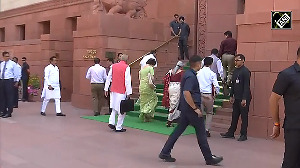 Leading economists have welcomed the measures initiated by the Reserve Bank of India on Tuesday to rein in soaring inflation, saying that price rise has become a more serious and larger issue.
Leading economists have welcomed the measures initiated by the Reserve Bank of India on Tuesday to rein in soaring inflation, saying that price rise has become a more serious and larger issue.Describing the annual monetary policy announced by RBI Governor D Subbarao as a progressive one, Ernst & Young India's Ashvin Parekh said, "We have almost reached a point where inflation has become unmanageable and RBI has clearly indicated that bringing down inflation to a comfortable level is its top priority."
The RBI has pegged the GDP growth rate for the current fiscal at 8 per cent, as against the government's projection of 9 per cent, whereas the economy grew by 8.6 per cent in 2010-11.
This is clear from the governor's call to the government to bring down subsidies on oil and fertilisers, failing which the apex bank may propose another rate hike in its July policy announcement, he said.
The RBI on Tuesday raised the key repo and reverse repo policy rates by 50 basis points each to 7.25 per cent and 6.25 per cent, respectively.
Repo is the rate at which the RBI provides credit to banks, while reverse repo is the rate at which banks park money with the apex bank.
The RBI also asked banks to hike the savings bank rate by 50 basis points to 4 per cent so as to provide relief to depositors from inflation.
This is the ninth time since March, 2010, that the RBI has hiked the key rates as part of efforts to cool down high inflation.
Fitch Ratings India's D K Pant opined that as inflation has been adamantly high all these months, the RBI has taken a right step to yank it down by compromising on growth, which is already visible from recent months' factory output data.
On the impact of the 50-bps hike in savings rate on the cost of funds for banks, Pant said considering that on an average 30 per cent of a bank's total funds are in savings and current accounts, Tuesday's hike will translate into a 15 bps escalation
Crisil chief economist DK Joshi said: "Policy basically reflects that inflation is a much larger problem as RBI's efforts in controlling it have not had the desired effect. We have come to a stage where managing inflation is more important, even at the cost of sacrificing growth".
But he added that the failure was also partly driven by supply-side inefficiencies.
He further said innovative steps like move to a single policy rate and the new borrowing facility for the banks in the form of the marginal standing facility, will help fasten the monetary transmission process by further curbing demand.
Parekh of Ernst & Young India also said that newly introduced marginal standing facility is an innovative step to contain volatility in the call money market.
Ideally, the call money rates should move with the repo and reverse repo rates, so is the move to single policy rate as well as increasing the interest rate on savings rate, he added.
On the apex bank's call to government to cut oil and fertiliser subsidies as a fiscal measure to contain inflation and its probable cascading effect on inflation, Pant said oil price hike will have some impact on inflation.
But, he added, it will be offset if the monetary transmission takes its full effect, following the steepest hike RBI effected today on its policy rates as it will help contain demand.
The economists have also said their agencies would soon be revising downward their GDP growth projections.
However, Pant said he would rather wait to get a clear picture on the monsoon front to take a call on the GDP growth saying he would stick to 8.3 per cent as of now.






 © 2025
© 2025